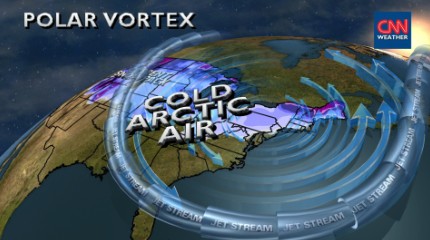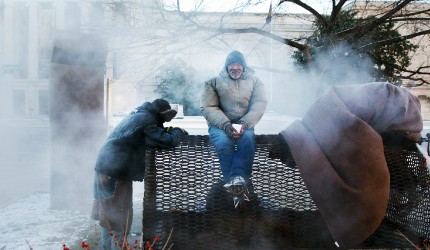Results 1 to 1 of 1
Thread Information
Users Browsing this Thread
There are currently 1 users browsing this thread. (0 members and 1 guests)
-
01-08-2014, 01:56 AM #1
Is climate change responsible for record cold in U.S.?
Is climate change responsible for record cold in U.S.?
January 7th, 2014
03:04 PM ET
By Mick Krever, CNN
Are the record-low temperatures in the United States and Canada – not to mention the extreme flooding in the UK and a record heat wave in Australia – the result of climate change?
Maybe not, but that says nothing about the validity of climate change, Climatologist Richard Alley told CNN’s Hala Gorani, sitting in for Christiane Amanpour, on Tuesday.
“Maybe a little bit of climate change, but this is mostly weather – big, exciting weather,” he said. “We’ve only warmed it one degree, and this is a 20-degree cold snap. So mostly, this is weather.”
In other words, higher sea levels from greenhouse gases may have contributed to recent flooding in the UK, but the temperatures are mostly the result of a fluke event, the shifting south of frigid polar winds, known as the polar vortex.

But it’s not nearly as simple as just saying the cold snap is not a result of climate change.
“We know the globe is warm,” he said. “If you look today, the average temperature of the whole world is above its long-term average.”
Climate skeptics are using the record cold spell as an argument in support of their contention that the phenomenon is not real.

“We scientists don’t like to say ‘undeniable’ – we like to say very high confidence,” Alley said. But, he went on, if he drops his pen he can also say with high confidence that it’s going to fall down, not float upwards.
“Now if I drop my pen at the moment you turn on your giant electromagnet it might float up, but you know the answer.”
The science, he said, is undeniable.
“The knowledge that CO2 is a greenhouse gas and it has a warming influence we’ve had for more than a century,” he said. “And the real physics of it were refined by the Air Force after World War II when they were working on sensors for heat-seeking missiles.”
“In some bizarre sense, to deny global warming is to question the ability of the Air Force to put the right sensor on the heat-seeking missile.”
“Knowing that CO2 is a greenhouse gas doesn’t tell you who to vote for; it doesn’t tell you what taxes to support. It gives you knowledge that you can use.”
Responding to climate change, he said, is a matter of either reducing the amount of CO2 people put into the air, or putting some of that CO2 back into the earth.
“The first degree of warming doesn’t cost that much. We’ve had that one. The next degree costs more than the first one. The next degree costs more than that one.”
“As we raise the temperature going through decades and beyond, you start to get to the point where it’s hard to work outside in the tropics; you get to the point where our crops have trouble growing because they’re just too hot; you get to the point where you really worry about melting big chunks of ice that are sitting in Greenland and Antarctica and raising sea level a lot.”
“I am very worried that if we don’t respond, that we end up worse off,” he said. “Eventually the losers are our grandchildren and their grandchildren.”
http://amanpour.blogs.cnn.com/2014/0...u-s/?hpt=hp_t2
NO AMNESTY
Don't reward the criminal actions of millions of illegal aliens by giving them citizenship.
Sign in and post comments here.
Please support our fight against illegal immigration by joining ALIPAC's email alerts here https://eepurl.com/cktGTn


 LinkBack URL
LinkBack URL About LinkBacks
About LinkBacks




 Reply With Quote
Reply With Quote


As Sen. Cortez Masto Scuttles Mayorkas' Impeachment, Illegal...
04-18-2024, 06:27 AM in Americans Killed By illegal immigrants / illegals